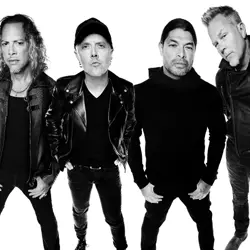 Metallica
MetallicaMusic Feeds published this article today with the headline - "Kirk Hammett Says Metallica Warned The World About Streaming". Now in that article, it says that the band "...had the foresight to predict what would become of the music industry under the ubiquitous streaming model of today." Now, I don't know about that they knew exactly that Streaming would be a thing - but certainly in the industry since at least the early days of iTunes being king, there was talk of models where it "feels like free" to the customer to access music.
Now - was Lars the right guy to be leading the charge at the time? Probably not - he was fairly maligned at the time because at roughly the same time, he was releasing his "Some Kind of Monster" Documentary film where he was seen to sell his collection of artworks for millions and millions of dollars - and the image of the "hard done by" artist who was "suffering" at the hands of a 'few' free downloads felt fairly hollow.
BUT - was he right? Yeah sure, but probably not in the way that it seems here (of course, the rights of copyright owners should always be honoured), and he also didn't have the foresight or perhaps power at the time to also propose a new model - just yell at everyone else that they were wrong. I DO love the fact that they, as one of the largest bands in the world, DID take the reins after that and held on to their own power byt doing things like recording EVERY live show they did and allowing people to buy the recordings to those shows IMMEDIATELY after the show and really taking care of the fans that they have. They ARE 100% incredibly fan-driven and I reckon NO-ONE can dispute that.
At the same time that all of this was happening, the music industry/major labels ESPECIALLY didn't move fast enough/were extremely resistant to move on from a system that AT THAT TIME, kept them all fat and giggly with CD sales, merchandise and FAT live touring advances. They thought the bubble would never burst - and burst it did, when tech company Apple developed the iPod and the proprietary software to load music on to it and purchase tracks from, at a very reasonable 99c USD/$1.69 AUD - and load their old P2P acquired MP3s on to it as well - and once the majors FINALLY were over the barrel and had to join the modern world, they did so for pennies on the dollar that they were offered initially, but turned down in favour of keeping things the way they were. It now meant that a TECH company was the biggest player in music - and that then led to ex-Spotify CEO being 'inspired' to create a legal model that met the same needs that Napster met, and overtook Apple as the number 1 music platform worldwide, resulting in the system we see today. The streaming world is an interesting one, in that if artists can manage to garner a fanbase, and have a number of people listening (often in the hundreds of thousands or millions) in order to be sustainable, it can start a bit of a perpetual motion machine for them, attracting playlists and more, and artists stand to make more money than they ever have from singles without the expense of having to manufacture CDs for each "unit" sold, but also at the other end of the spectrum, even streaming in the hundreds of thousands only results in measly returns and certainly not enough to tour or re-invest. It's full of opportunity, but also rife with poverty. There has certainly always been haves and have-nots, but it seems that the gap is wider than ever.
Don't miss a beat with our FREE daily newsletter
As for going ahead now in the streaming world.... he said in the Classic Rock interview that Music Feeds references: "There’s definitely a new way for getting music out there, but it isn’t as effective as the music industry pre-Napster. But we’re stuck with it. There needs to be some sort of midway point where the two come together, or another completely new model comes in."
"It is harder for these younger bands to get their music out there. I’ll tell you one thing: because of covid there’s upwards of half a billion new guitar players in the world, bro. That bodes very well for the future of music. It was inspirational for me just knowing there’s gonna be that many more musicians in the world trying to make great music. There’s so much disorganisation in the world right now, so much division. Music brings people together. Music organises people and their thoughts. Maybe because there’s more musicians it’ll make for a better future for everyone. I’m just being optimistic [laughs]."
















